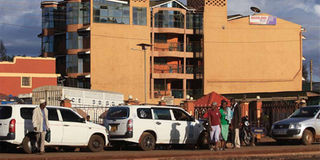From trading post to modern metropolis

Taxi operators wait for customers outside a hotel in Marsabit town on May 4, 2017. Marsabit is no longer the out-of-reach dusty trading centre that it was in the 1950s, having gradually grown into a modern metropolis. PHOTO| JOSEPH KANYI
What you need to know:
- Marsabit is no longer the out-of-reach dusty trading centre that it was in the 1950s, having gradually grown into a modern metropolis. Devolution breathed life into it.
- The challenge for investors taking advantage of the growing population to put up commercial and residential properties, is that Marsabit lacks construction companies, forcing developers to contract companies from either Meru, or Nairobi, which is 560 kilometres away.
- In the absence of real estate and property agents, brokers bridge the gap between buyers and sellers of land in Marsabit.
Legend has it that Marsabit was named after a Burji farmer called Marsa, who was brought from Ethiopia, by colonialists, to teach the locals farming.
“When his masters called out his name, Marsa would answer ‘abit’ (which means ‘yes’ in Amharic). And so the place came to be known as Marsa-Abeit, and later Marsabit,” says Celine Adalo a businesswoman in Marsabit town.
Marsabit is no longer the out-of-reach dusty trading centre that it was in the 1950s, having gradually grown into a modern metropolis. Devolution breathed life into it, bringing with it tarmacked feeder roads and an improved road network connecting the north-eastern town to Ethiopia, beckoning investors to set up shop.
The formerly sleepy town where hardly any shops remained open past 7pm, now has business hours extending to 9pm, thanks to the street lights that were put up to enhance security.

Total oil and gas company facility in Marsabit town on May 25, 2017. The branch is set to open up on June 1, 2017. PHOTO| IRENE MWENDWA
Previously known for animosities among local herders, that delayed its development, the capital city of Marsabit County, the largest county in Kenya covering a surface area of more than 66 square kilometres, has gradually grown into a hotspot for investors.
Since 2013 there has been an influx of county government workers as well as entrepreneurs and investors, who have raised demand for both commercial and residential buildings.
Mud houses of yesteryears were upgraded into iron sheet structures and then into the current more permanent stone structures which drove rent upwards.
“It is a challenge to find business premises, let alone a rental house to live in,” says Mary Njeri, whose rent for the boutique she runs in the central business district doubled from Sh3,000 five years ago to the current Sh6,500.
Likewise, the cost of a one-bedroomed house rose from Sh6,000 to more than Sh10,000.
Those with running water – a rare commodity – cost much more. The newer structures are self-contained, incorporating kitchens, bathrooms, toilets and modern décor.

Men take a ride on top of pebbles and cement in a vehicle in Marsabit town on May 25, 2017. Construction materials in the town are on high demand with the rising number of investors in residential business. PHOTO| IRENE MWENDWA
The challenge for investors taking advantage of the growing population to put up commercial and residential properties, is that Marsabit lacks construction companies, forcing developers to contract companies from either Meru, or Nairobi, which is 560 kilometres away.
The engineer in charge of the construction of a Total petroleum outlet in the town, who identified himself as Mr Kihara, says that finding skilled manpower and construction materials in the vast county is a major challenge.
For instance, he says local hardware shops lack the capacity to supply the various ongoing construction projects, forcing contractors to buy materials like cement directly from producers.
“Building materials are also hard to find. Investors need to focus on the increased need for building materials since the town is growing at an ever faster rate,” says Mr Kihara.
In the absence of real estate and property agents, brokers bridge the gap between buyers and sellers of land in Marsabit. County director of survey Abdullahi Hassan says that the county has no land valuers, so the landowners determine their own prices.
The property boon has gone beyond the town, to its outskirts. In the past, vast and stony expanses would greet you from all directions away from the town centre, but the completion of the Isiolo-Moyale highway which passes through Marsabit, has seen modern settlements mushroom in the outskirts of Marsabit town, complete with major hotels such as Jirime Hotel, three kilometres away from town.
Other hotels in town include Saku Guest House, Silvia Inn, Imperial Dale, Gof Hotel and Normads Hotel among others.





